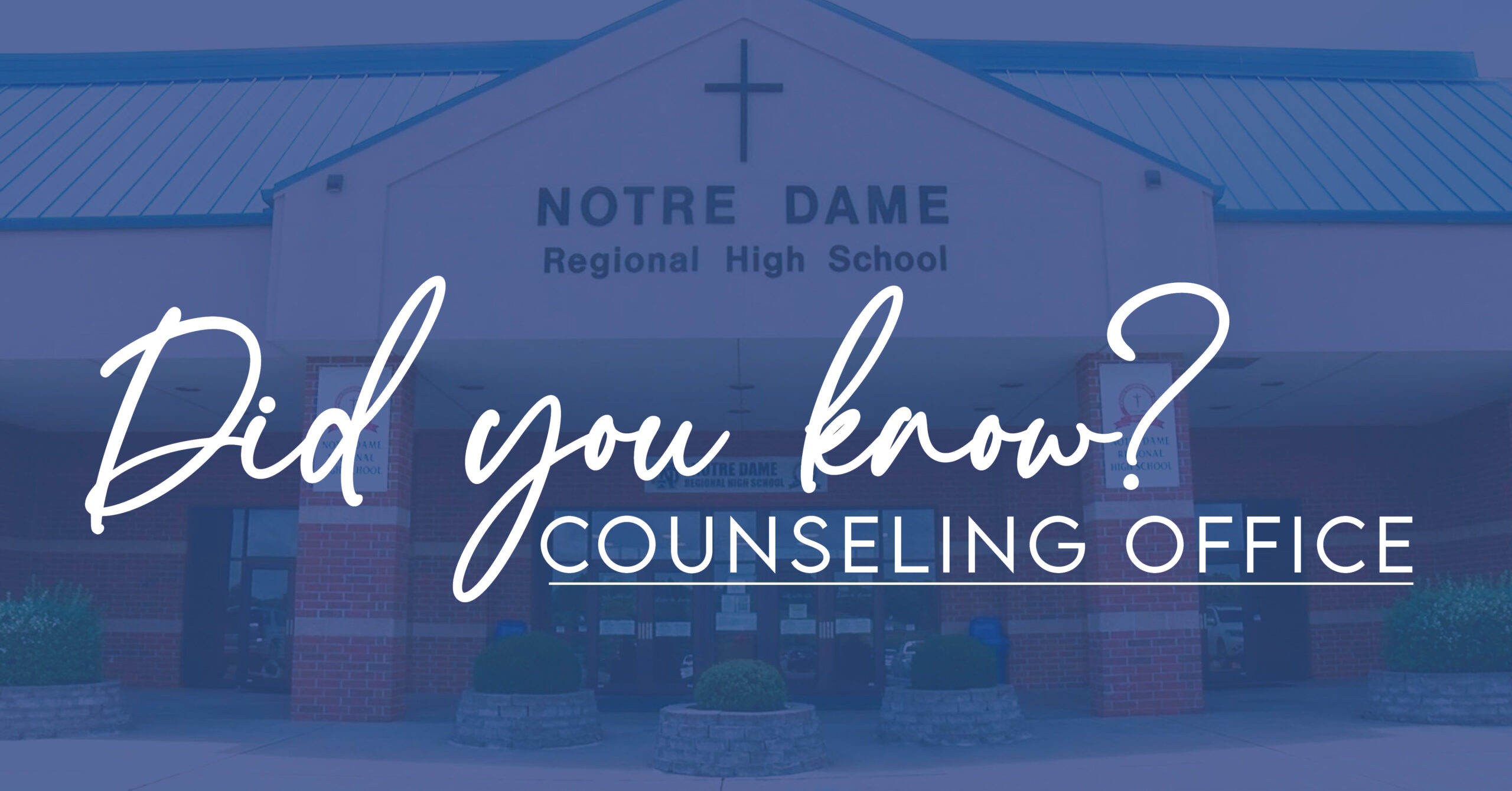During the 2019-2020 school year, the Notre Dame Counselors’ Office hired its third certified counselor, completing the transition from Guidance Office to Counselors’ Office. The school’s three counselors are all nationally certified, hold a master’s degree in their field, and uphold ethical and professional standards.
Director of the Counselors’ Office Amanda Mueth said, “We have an excellent team in place that truly embodies the vision we had when expanding the third counselor position.”
The school’s previously named Guidance Office provided students with college, career, personal and crisis guidance. Today, the Counselors’ Office delivers a comprehensive school counseling program that promotes student success and development over three main areas: social emotional learning, academics, and career or post-secondary planning and exploration.
With the expansion of the Counselors’ Office, the school is able to accommodate two class counselors, Ruth Ann Hester and Alexana Koishor, and Mueth as the director of counseling. This allows for the counseling team to prioritize student wellness and mental health while still maintaining a student-to-counselor ratio of 208: 1. That ratio beats the American School Counselor Association (ASCA) recommended ratio of 250: 1.
“As the counselors follow their students throughout their four years, students become very comfortable stopping by our office and asking questions or scheduling an appointment,” said Mueth. “We support students in a variety of ways, and we feel that what we offer is a critical part of the big picture in their education at Notre Dame.”
Social Emotional Learning
Notre Dame’s counselors provide Social Emotional Learning (SEL) lessons as a part of the comprehensive counseling program. SEL is a method of promoting holistic child development by teaching students skills such as self-regulation, persistence, empathy, self-awareness and mindfulness.
“We implement lessons in the classroom setting that allow students opportunities to learn, reflect, and set goals in their relationship with themselves and with others. We work within our team to curtail the activities within our curriculum specifically to each class based on what we have learned through student relationships and in collaboration with faculty,” said Mueth. “We also have more informal opportunities like ‘Candy with the Counselors’ where students can participate in activities about aspects of their development like their mindset, such as re-framing how we talk to or compliment others or how we can change from a negative mindset to a positive one. Additionally, in Health class we present information about mental health, coping skills, definitions and signs of depression and anxiety, self-harm, warning signs for suicide, and what to do if you or someone you know is struggling.”
Individually, our counselors show empathy and support in one-on-one sessions with students, provide resources for handling social and emotional experiences, and provide assistance to students seeking support for long term therapy services.
“Student wellness and mental health is at the forefront of all the ways we engage with our students, and we hope these conversations help continue to break down barriers both in our school and throughout our students’ lives,” said Mueth.
Academics & Career / Post-Secondary Planning
Not only do the Notre Dame counselors support students’ mental health, they also assist students in their academic growth and development during high school and in preparation for live beyond Notre Dame.
While at Notre Dame, counselors work with students and their families to facilitate individualized course planning based on student goals. Counselors also inform students of local, state and national opportunities for external career exploration, and leadership and interpersonal development.
Internally, our counselors collaborate with administrators, teachers and school staff on maintaining an environment that encourages academic success.
Notre Dame Assistant Principal and Dean of Academics Paul Unterreiner said, “We all work hand in hand to support student engagement and learning. We have a team that meets regularly to discuss students’ needs from an academic and emotional standpoint. From a teacher standpoint, each teacher communicates with counselors any concerns about a student. The counselors typically call that student in for a conversation. This collaborative environment allows for more eyes and ears on all students, and our faculty do an incredible job of being aware of students who may need time with our counselors.”
Additionally, counselors develop long-term course plans, develop curriculum, and collaborate with the school’s learning consultant regarding student IEPs and 504s. The director of the counselors’ office coordinates a number of programs for students; including, the A+ Program, Advanced Placement (AP), dual credit, and all testing (PSAT/NMSQT, Test Prep ACT and ACT).
In preparation for career and post-secondary life, counselors help students explore a variety of educational and career options. Through one-on-one discussions, classroom presentations, and the use of resources, school counselors give students the tools they need for college planning and career exploration. Counselors aid students with college searches, planning on-sites with colleges and vocational technical schools, provide information on scholarship opportunities and plan career days.
“We understand how career choices and life plans can shift. With that in mind, we really focus on teaching students skills–how do you access the information you need from this college or technical school? How do you write an email to that admissions counselor to get additional information that isn’t online? Who are the best people to talk to about your interest in military service or religious life? How do you look up what college credit transfers to schools of interest? Teaching students to make a phone call is one of my personal favorites,” said Mueth, “and we will facilitate that teaching moment any time we can. The more we can build skill sets into our students’ experience, the more we expand the tools that prepare them for life, including navigating changes in post-secondary education and career plans.”



